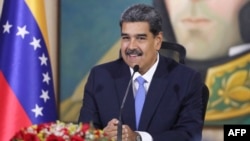U.S. President Joe Biden on Wednesday continued to pressure leaders of nations sharing a region with Venezuela to resolve the oil-rich nation's political crisis stemming from its vote last month.
The White House, meanwhile, reaffirmed its belief that Venezuelan President Nicolás Maduro fraudulently claimed he’d won reelection. Maduro is cracking down on his political opponents, prompting rights groups to sound the alarm.
In a call between Biden and Panamanian President José Raúl Mulino on Wednesday, the two leaders discussed their concerns about "serious flaws" in the vote count following the Venezuelan election on July 28, according to a White House readout.
"President Biden thanked President Mulino for his effort to advance democracy in both Panama and the hemisphere, including Panama’s efforts to mobilize regional support to restore democratic norms in Venezuela and condemn political repression,” the readout stated.
The White House also took pains Wednesday to reiterate its stance that the Maduro-controlled National Electoral Council incorrectly tabulated the vote.
“It is abundantly clear to the majority of the Venezuelan people, the United States and a growing number of countries that the CNE [Venezuela's electoral council] has not provided full, detailed tallied votes because they would show that Edmundo González Urrutia won the vote,” said White House press secretary Karine Jean-Pierre. “Maduro must recognize it and engage in a constructive, inclusive dialogue in good faith with the opposition to restore democratic norms peacefully in accordance with Venezuelan electoral law and the wishes of the people.”
Washington’s ties with Caracas have been strained over the past two decades not only by ideological differences with the left-leaning country but also by the United States' crippling sanctions on the nation. The resulting economic crisis has led to the northward exodus of millions of Venezuelans, leaving both U.S. authorities and those migrants in a delicate position as this crisis simmers.
For his part, Madruo has said he won the election and considers it settled. He says that those hurt in the crackdown are among “the ranks of the National Guard and the police. Their actions have been in total accordance with the Constitution and the law.”
The United Nations, meanwhile, sounded the alarm this week over arbitrary detentions and “disproportionate use of force” in the country after the poll. The U.N. human rights body said forces loyal to Maduro have rounded up more than 2,000 people for demonstrating against him or casting doubt on his claims that he won a third term fairly.
"It is especially troubling that so many people are being detained, accused or charged either with incitement to hatred or under counterterrorism legislation,” U.N. High Commissioner for Human Rights Volker Türk said in a statement. “Criminal law must never be used to limit unduly the rights to freedom of expression, peaceful assembly and association.”
Scholars of the region are calling for stronger action from world leaders.
“What we're seeing there are human rights violations, and while many countries talk a big game, as we've seen around the world right now, few countries actually will step in and intervene, unfortunately, to protect civilians in situations where their rights are being violated and their physical integrity is being violated,” said Maya Camargo-Vemuri, a researcher on mass atrocities and government repression at Johns Hopkins University.
Wilson Center Chief of Staff Eddy Acevedo, who is currently in the region to look at issues stemming from the Venezuelan poll, told VOA he questions the White House’s strategy of “giving diplomacy a chance as it evaluates next steps.”
“While I understand the rationale of trying to get Mexico, Colombia, and Brazil to do the right thing, they have failed to do so as of now,” he told VOA via email. “Therefore, the U.S. must take the lead in rallying not only regional support but the rest of the international community to exert pressure on Maduro to allow a democratic transition in line with the results of the election. It's important to also remember countries like Panama, Costa Rica, and Chile who have stood strong in standing up for democratic principles in Venezuela.”
And, he said, he believes a rerun of the poll — as proposed by Brazil — is not the answer.
“The Brazilians are shopping around a proposal for a second election, and this must be a nonstarter,” he said. “The Venezuelan people have spoken, and the results are clear. No second election. Punto!”
Celia Mendoza contributed from the White House; Kim Lewis contributed from Washington.




